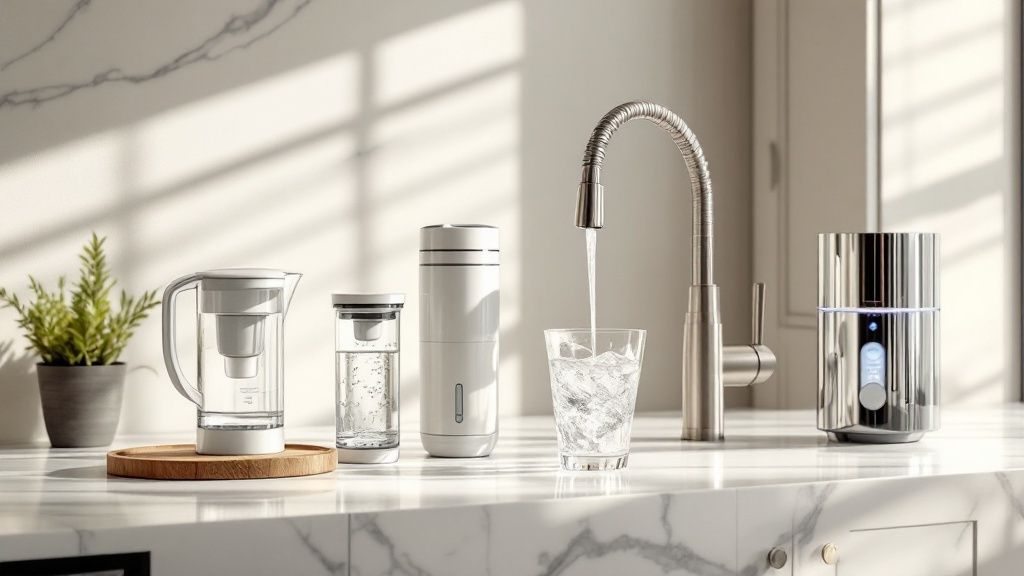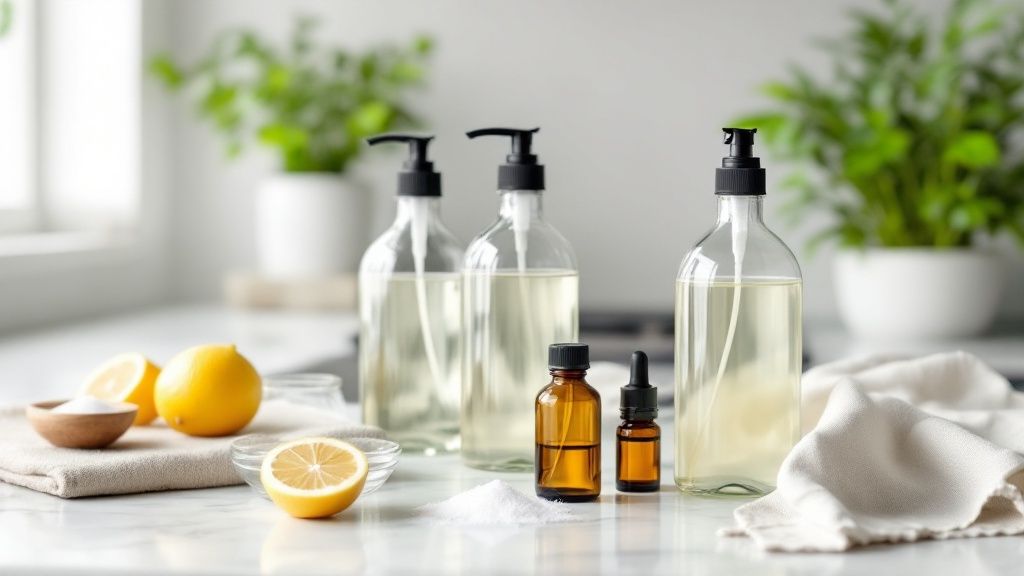
Natural Cleaning Solutions Recipes for a Sparkling Home
Welcome! Making the switch to natural cleaning is one of the kindest things you can do for your home and family. These natural cleaning solutions recipes are built on simple, powerhouse ingredients like vinegar and baking soda that easily replace harsh chemicals, helping you create a healthier, more welcoming living space.
Why Choose Natural Cleaning for Your Home
Embracing natural cleaning is about so much more than just getting sparkling surfaces—it's a lifestyle choice that truly nurtures your home's environment. When you opt for DIY solutions, you take complete control of the ingredients that come into contact with your family and pets.
This shift away from harsh, synthetic chemicals can lead to noticeably better indoor air quality and a significant drop in potential irritants. Many people find that even a few simple swaps make a huge difference in their daily well-being, and we're here to guide you with care and expertise.
The Benefits of a Chemical-Free Clean
Switching to homemade cleaners brings some pretty compelling advantages that go far beyond just having a tidy space. You’re not only cleaning your home but also doing your part for a healthier planet.
- Improved Indoor Air Quality: Commercial cleaners often release volatile organic compounds (VOCs) that can linger in the air. Natural ingredients like lemon and essential oils leave behind a genuinely fresh scent without airborne chemicals.
- Cost-Effectiveness: Pantry staples like vinegar and baking soda are incredibly affordable. A single bottle of castile soap, for example, can be diluted to create a whole arsenal of cleaning products, saving you a ton of money over time.
- Reduced Environmental Impact: By making your own cleaners in reusable bottles, you drastically cut down on plastic waste. Plus, the ingredients themselves are biodegradable and much gentler on our waterways.
This growing preference for eco-conscious living isn't just a passing trend. The global natural household cleaners market was valued at approximately USD 6.97 billion in 2024 and is projected to nearly double by 2030, driven by a huge demand for plant-based formulas.
At Wonders Emporium Shop, we believe that creating a safe, welcoming home shouldn't be complicated. Our commitment to quality, uniqueness, and customer care extends to the advice we share, empowering you to make choices that feel good.
Beyond just tackling visible dirt, an important part of a healthier home is dealing with unpleasant smells. You can find more comprehensive strategies for eliminating common home odors to complement your new cleaning routine. As a small business, Owned & Operated by Boricua Innovations LLC, we put our heart and heritage into everything we share with you.
Building Your Natural Cleaning Toolkit
Before you dive into mixing your first batch of natural cleaning solutions recipes, let's put together your toolkit. Think of this as creating your personal, eco-friendly cleaning arsenal. Having everything ready to go makes the whole process feel less like a chore and more like a satisfying project.
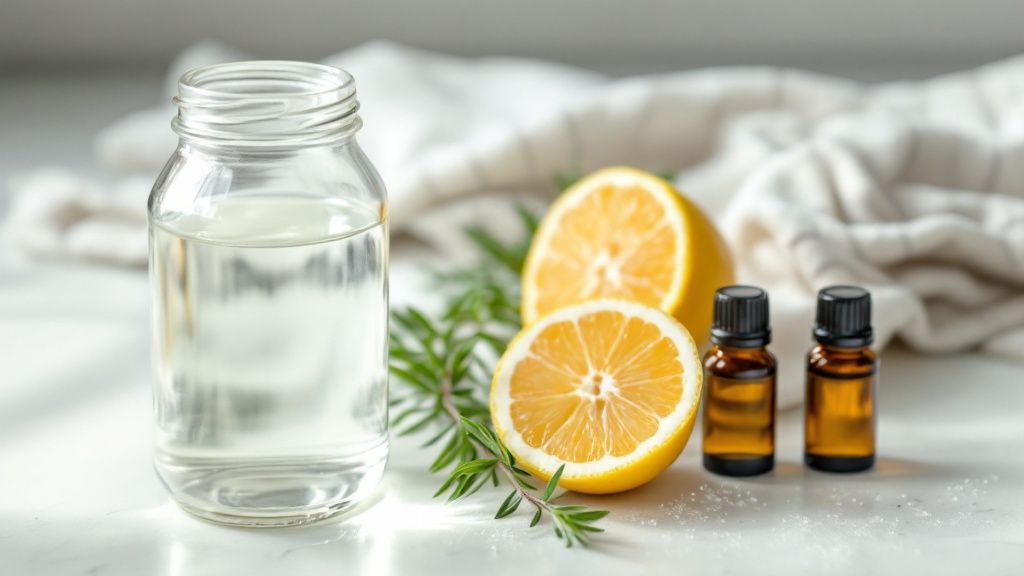
You’ll quickly find that a few core ingredients are the backbone of nearly every effective recipe. These are simple, powerhouse items that are cheap, easy to find, and unbelievably versatile.
The Essential Ingredients
The real beauty of DIY cleaning is just how simple it is. You don't need a cupboard overflowing with a dozen different products. Most household tasks can be tackled with just a few key items.
- Distilled White Vinegar: Its mild acidity is a miracle worker. It cuts right through grease, dissolves pesky mineral deposits around faucets, and zaps odors. A true multi-purpose hero.
- Baking Soda: This is your gentle-but-tough friend. It’s a fantastic mild abrasive for scrubbing away grime without scratching surfaces. It also works wonders as a natural deodorizer.
- Castile Soap: A simple, plant-based soap that cleans effectively without being harsh. It's the perfect base for all-purpose sprays that are safe for a huge variety of surfaces.
- Essential Oils: These aren't just for making things smell nice! Certain oils bring their own cleaning power. Lemon is a fantastic degreaser, tea tree has impressive antimicrobial properties, and lavender leaves everything with a calm, fresh scent.
To give you a better idea of how these simple items can transform your cleaning routine, here's a quick reference guide.
Core Ingredients and Their Cleaning Superpowers
| Ingredient | Primary Cleaning Property | Best For |
|---|---|---|
| White Vinegar | Acidic Disinfectant | Cutting grease, removing mineral deposits, glass cleaning, neutralizing odors. |
| Baking Soda | Mild Abrasive & Deodorizer | Scrubbing sinks and tubs, deodorizing carpets and fridges, lifting stains. |
| Castile Soap | Gentle Surfactant | All-purpose surface sprays, dish soap, mopping solutions. |
| Lemon Juice | Natural Bleach & Degreaser | Whitening grout, cutting through greasy messes, shining fixtures. |
| Essential Oils | Antimicrobial & Aromatic | Disinfecting, scenting cleaners (tea tree, lavender, lemon, orange). |
With this handful of ingredients, you're equipped to handle almost any cleaning challenge that comes your way.
The Right Equipment for the Job
Having the right tools is just as important as the ingredients. Our friendly advice? Invest in a few reusable items. It’s a small upfront cost that reduces waste and makes your entire cleaning routine so much smoother.
You'll definitely want these on hand:
- Glass Spray Bottles: They're durable, endlessly reusable, and—most importantly—they won’t react with acidic ingredients like vinegar or essential oils.
- Microfiber Cloths: These are champions at trapping dust and absorbing liquids, leaving surfaces totally streak-free without needing a single paper towel.
- A Funnel: Such a simple tool, but it's a game-changer. It prevents spills and makes pouring your homemade concoctions into their bottles a completely mess-free experience.
Pro Tip: Keep all your supplies neatly together in a caddy or a bin. We've found that when everything is in one place, you’re so much more likely to reach for your homemade solutions.
Getting organized is the final step to set yourself up for success. If you need some ideas, check out our guide on how to organize cleaning supplies for practical tips.
Everyday All-Purpose Cleaner Recipes
Welcome to the heart of your natural cleaning journey! This is where simple pantry staples become powerful, everyday solutions. These natural cleaning solutions recipes are designed to be your go-to helpers for daily spills, smudges, and general upkeep.
Here is all it takes to create your own effective, eco-friendly all-purpose cleaner right at home.
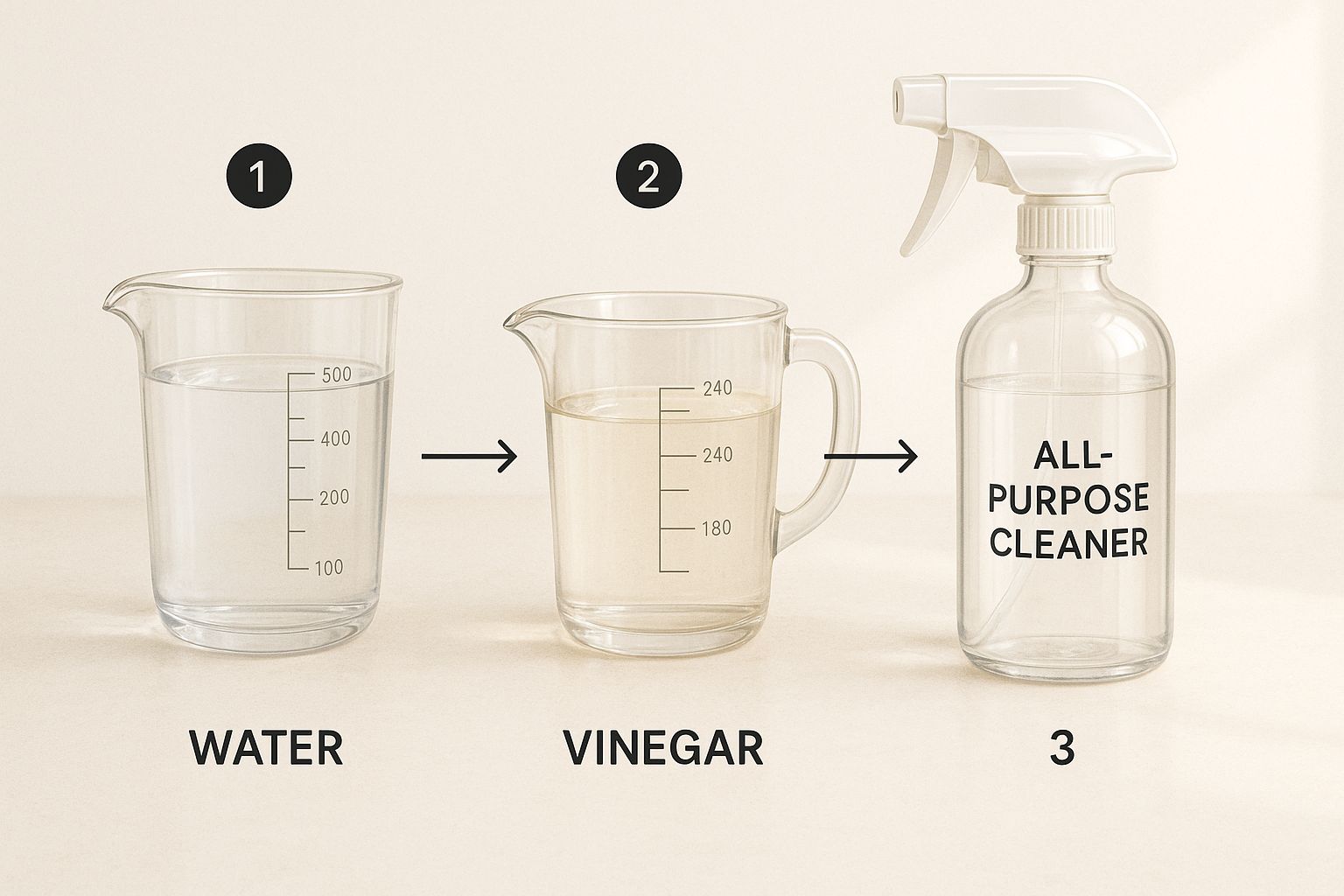
You only need a few basic, renewable ingredients. It really highlights how simple it is to reduce your reliance on harsh chemicals and start cleaning more naturally.
The Classic Vinegar All-Purpose Spray
This is the quintessential workhorse of natural cleaning. Its gentle acidity is perfect for cutting through grease and grime on a wide variety of non-porous surfaces like kitchen counters, stovetops, and the outside of appliances.
Step-by-Step Instructions:
- Gather your ingredients: 1 part distilled white vinegar, 1 part distilled water, and 10-15 drops of essential oil (optional, but lemon or orange are great for degreasing!).
- Using a funnel, carefully combine everything in a reusable glass spray bottle.
- Give it a gentle shake to mix. That's it!
This simple formula is fantastic for shining up chrome faucets or making your stainless steel sink sparkle. It's a personal favorite for wiping down the dining table after a messy family meal.
A Quick Word of Caution: Because vinegar is acidic, it's best to avoid using this particular recipe on natural stone surfaces like marble or granite, as it may cause etching over time.
The Gentle Castile Soap Cleaner
For more delicate surfaces that need a softer touch, a castile soap-based cleaner is the ideal choice. It cleans effectively without the acidity of vinegar, making it safe for sealed wood, natural stone, and even painted surfaces.
Step-by-Step Instructions:
- Gather your ingredients: 2 cups of distilled water, 1-2 teaspoons of liquid castile soap, and 10 drops of lavender or tea tree essential oil (optional).
- To avoid a bottle full of suds, add the water to your spray bottle first.
- Gently pour in the castile soap and essential oils, then secure the top.
We love using this gentle blend to wipe down high chairs and wooden toys, knowing it’s completely safe and non-toxic. For those moments that require a little something extra, you might be interested in exploring our guide on unique cleaning solutions that tackle more specific challenges.
Tackling Kitchen and Bathroom Grime
Some rooms in our homes just work a little harder than others, and they deserve cleaning solutions with a bit more muscle. These specialized natural cleaning solutions recipes for kitchens and bathrooms will help you handle tough grime without any harsh chemicals.
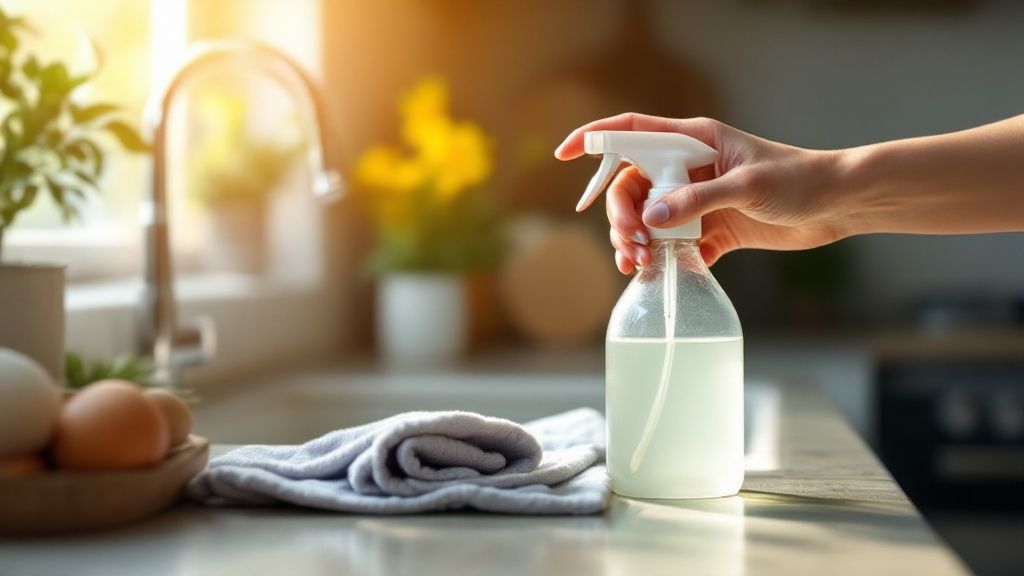
From soap scum in the shower to greasy splatters on the stove, these areas present unique cleaning challenges. But you don't need a cabinet full of aggressive cleaners to get the job done right.
The Mighty Baking Soda Scouring Paste
For tubs, sinks, and tile, this simple paste is a true game-changer. Baking soda is a gentle abrasive, which means it helps scrub away stubborn soap scum and hard water stains without scratching delicate surfaces like porcelain or fiberglass.
Step-by-Step Instructions:
- Start with 1/2 cup of baking soda in a small bowl.
- Slowly add just enough water to form a thick, spreadable paste—think frosting consistency.
- For an extra boost of cleaning power, mix in a tablespoon of liquid castile soap.
- Apply the paste with a sponge or cloth, scrub in a circular motion, and rinse it all away.
It’s perfect for restoring the shine to your bathroom fixtures and leaving your kitchen sink absolutely gleaming.
A Natural Mold and Mildew Fighter
Damp areas like showers can be prone to mold and mildew. Instead of reaching for bleach, you can turn to the natural antimicrobial properties of tea tree essential oil for a targeted, effective approach.
Step-by-Step Instructions:
- Combine 2 cups of water with 2 teaspoons of tea tree essential oil in a glass spray bottle.
- Shake it well before each use to make sure the oil is distributed.
- Lightly spray the solution on tiles, grout, and your shower curtain after each use.
- There’s no need to rinse it off; just let it air dry.
Remember, consistency is your best friend when dealing with mildew. A quick spray a few times a week is so much easier than a deep scrub once a month.
Disinfect and Deodorize Cutting Boards
Wooden and plastic cutting boards can harbor bacteria and absorb strong odors. A simple lemon and salt scrub is a wonderfully effective way to clean and sanitize them naturally.
Step-by-Step Instructions:
- Sprinkle a coarse salt, like sea salt or kosher salt, liberally over the surface of your cutting board.
- Cut a lemon in half and use one of the halves to scrub the salt right into the board.
- Let that salty, lemony mixture sit for about 10-15 minutes to work its magic.
- Finally, rinse the board with hot water and let it air dry completely.
This technique not only helps to lift stubborn stains but also neutralizes odors, leaving your cutting boards fresh. Speaking of common household issues, accidents happen, and knowing how to remove candle wax from any surface is another useful tip to have in your back pocket.
Fresh and Clean Laundry and Dish Recipes
Your natural cleaning journey doesn't have to stop with shiny surfaces. Let's bring that same simple, effective philosophy to two of the biggest chores in any home: laundry and dishes. With these natural cleaning solutions recipes, you can ditch even more of those harsh commercial chemicals.
It’s a change more and more people are making. A quick look at Google Trends shows that searches for "natural laundry detergent" shot up by 42% in just one year, showing a clear desire for healthier, more transparent options.
Homemade Laundry Powder
Imagine pulling clothes from the dryer that smell genuinely fresh and clean, without any overpowering synthetic fragrances. This simple laundry powder uses the power of natural minerals to lift away dirt and soften fabrics.
What You'll Need:
- 1 cup Washing Soda: This is the workhorse. It cuts through grease and grime while softening hard water.
- 1 cup Borax: A naturally occurring mineral, borax helps brighten your whites and knock out stubborn odors.
- 1 bar of Castile Soap (grated): Just grab a cheese grater and get this into fine shavings. It's a gentle, plant-based cleaner that's tough on dirt but kind to your fabrics.
Simply mix all three ingredients together in a large, airtight container. For an average load, you'll only need 1-2 tablespoons. It's an incredibly effective and budget-friendly alternative.
Natural Dishwasher Detergent and Rinse Aid
You can bring that same DIY spirit to your dishwasher for sparkling, spot-free results. This is a two-part system: a simple powder that does the heavy lifting and a vinegar rinse that leaves your glassware crystal clear.
For the Dishwasher Powder:
- 1 cup Washing Soda
- 1 cup Kosher Salt: The coarse texture acts like a gentle scrubber.
- 1/2 cup Citric Acid: This is your secret weapon against hard water buildup.
- 1/2 cup Baking Soda
Combine everything in an airtight container. Use about 1 tablespoon per load. For really tough messes, give your dishes a quick pre-rinse using our durable Cleaning Natural Sea Sponges before loading them up.
For the Rinse Aid: This is the easiest trick in the book. Just fill your dishwasher’s rinse aid dispenser with plain distilled white vinegar. It works as a natural rinse agent, preventing those annoying hard water spots.
Your Natural Cleaning Questions Answered
Making the switch to homemade cleaners is exciting, but it's totally normal to have a few questions. When you're used to commercial products, wondering about things like shelf life and effectiveness is natural. We've been there!
That’s why we’ve gathered the most common questions we hear. Think of this as your go-to guide for getting comfortable and confident with your new natural cleaning solutions recipes.
How Long Do Homemade Cleaners Last?
This is easily one of the most practical questions. Since these recipes don’t contain synthetic preservatives, they have a shorter shelf life. But that’s actually a good thing—it’s proof you're using fresh, simple ingredients!
For any water-based solutions, like our all-purpose sprays, a good rule of thumb is to make smaller batches you can use within 2 to 4 weeks. This keeps your cleaners fresh and at their peak power.
Are Natural Solutions Really as Effective?
For the overwhelming majority of your daily cleaning tasks, the answer is a huge yes! Natural ingredients are surprisingly tough on everyday grease, grime, and spills.
For those really heavy-duty jobs, they might require a little more elbow grease than their chemical counterparts. But the results are just as sparkling. It's a small trade-off for the peace of mind that comes from a chemical-free home.
The real beauty of natural cleaning is that you’re not just removing dirt; you're cultivating a healthier living environment for your family and pets.
Can I Use Any Essential Oil?
While it’s tempting to go with your favorite scent, not all essential oils are created equal when it comes to cleaning. For the best germ-fighting and grime-busting results, you’ll want to stick with oils that have known antimicrobial properties.
Here are a few of our favorites:
- Lemon and Orange are fantastic degreasers and leave behind that classic, bright "clean" scent.
- Tea Tree Oil is a true powerhouse, especially against mold and mildew.
- Lavender and Peppermint have great antibacterial qualities and make your home smell amazing.
One crucial thing to keep in mind is pet safety. Some oils, including tea tree and certain citrus oils, can be toxic to cats and dogs. If you have furry friends, it’s always best to do a quick search for pet-safe alternatives.
What Surfaces Should I Avoid Using Vinegar On?
Vinegar is a cleaning champion because of its acidity, but that same power can be too much for certain delicate surfaces.
It's really important to avoid using vinegar-based cleaners on natural stone. This includes surfaces like marble and granite, as the acid may etch the surface and leave it looking dull. You should also steer clear of using it on waxed wood floors and cast iron. For those materials, our gentle castile soap cleaner is the perfect, safe alternative.
We hope this guide leaves you feeling inspired and ready to start mixing! Embracing natural cleaning is a wonderful step towards a more mindful, healthy home. Here at Wonders Emporium Shop, we are committed to supporting your journey with quality products and advice you can trust.
Ready to build your natural cleaning toolkit? Explore our collection of high-quality, reusable glass spray bottles and other eco-friendly accessories to get started today!
Shop Our Eco-Friendly Cleaning Collection at wondersemporiumshop.com

